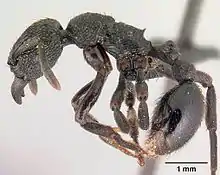Eutetramorium
Eutetramorium is a small genus of ants within the subfamily Myrmicinae. To date it contains three species found in Madagascar and Comoros.[3]
| Eutetramorium | |
|---|---|
 | |
| E. monticellii worker from Comoros | |
| Scientific classification | |
| Kingdom: | |
| Phylum: | |
| Class: | |
| Order: | |
| Family: | |
| Subfamily: | |
| Tribe: | |
| Genus: | Eutetramorium Emery, 1899 |
| Type species | |
| Eutetramorium mocquerysi[1] Emery, 1899 | |
| Diversity[2] | |
| 3 species | |
Species
- Eutetramorium mocquerysi Emery 1899 – Madagascar
- Eutetramorium monticellii Emery 1899 – Comoros
- Eutetramorium parvum Bolton & Fisher, 2014 – Madagascar
Description
The queen is extremely ergatoid in E. mocquerysi, alate in E. monticellii. In E. parvum a normal dealate queen is present in the type-series, but there is also a specimen that may be an ergatoid or a worker-queen intercaste, or possibly merely an oversized worker. Males are known only for E. mocquerysi, where it is smaller than conspecific workers.[3]
Taxonomy
This small genus was established by Emery (1899) for two conspicuous, large, darkly coloured Madagascan species that superficially resemble Tetramorium. Initially, Emery (1912, 1914) was of the opinion that the genus was referable to the tribe Myrmecinini, but Ashmead (1905) and Wheeler (1910) had already referred it to Tetramoriini, an opinion that Emery (1915, 1924) also came to accept. Bolton (1976) excluded Eutetramorium from Tetramoriini on morphological grounds, and tentatively transferred it to Myrmicini. This placement persisted until recently, when a molecular analysis of Myrmicini by Jansen & Savolainen (2010) showed that the monophyly of the tribe was dubious, and that Eutetramorium formed a clade with Huberia. The yet unpublished, more detailed, DNA analysis of Myrmicinae by Philip S. Ward has established that Eutetramorium belongs in a strongly supported, endemic Madagascan clade that also includes the other four genera: Malagidris, Myrmisaraka, Royidris and Vitsika.[3]
References
- Bolton, B. (2014). "Eutetramorium". AntCat. Retrieved 3 July 2014.
- Ashmead, W.H. (1905). "A skeleton of a new arrangement of the families, subfamilies, tribes and genera of the ants, or the superfamily Formicoidea". Canadian Entomologist. 37 (11): 381–384. doi:10.4039/ent37381-11.
- Bolton, B (1976). "The ant tribe Tetramoriini. Constituent genera, review of smaller genera and revision of Triglyphothrix Forel". Bulletin of the British Museum (Natural History) Entomology. 34: 281–379.
- Emery, C. (189.). "Formiche di Madagascar raccolte dal Sig. A. Mocquerys nei pressi della Baia di Antongil (1897–1898)." Bullettino della Società Entomologica Italiana, 31, 263–290
- Emery, C (1914). "Intorno alla classificazione dei Myrmicinae". Rendiconto delle Sessioni della R. Accademia delle Scienze dell'Istituto di Bologna (N.S.). 18: 29–42.
- Emery, C (1915). "Noms de sous-genres et de genres proposés pour la sous-famille des Myrmicinae". Modifications à la classification de ce groupe. Bulletin de la Société Entomologique de France. 1915: 189–192.
- Jansen, G.; Savolainen, R. (2010). "Molecular phylogeny of the ant tribe Myrmicini". Zoological Journal of the Linnean Society. 160: 482–495. doi:10.1111/j.1096-3642.2009.00604.x.
- Wheeler, W. M. (1910). "Ants, their structure, development and behaviour". Columbia University Biological Series. 9: 1–663.
 This article incorporates text from a scholarly publication published under a copyright license that allows anyone to reuse, revise, remix and redistribute the materials in any form for any purpose: Bolton, Barry; Fisher, Brian L. (2014), "The Madagascan endemic myrmicine ants related to Eutetramorium (Hymenoptera: Formicidae): taxonomy of the genera Eutetramorium Emery, Malagidris nom. n., Myrmisaraka gen. n., Royidris gen. n., and Vitsika gen. n.", Zootaxa, 3791 (1): 1–99, doi:10.11646/zootaxa.3791.1.1, PMID 24869996 Please check the source for the exact licensing terms.
This article incorporates text from a scholarly publication published under a copyright license that allows anyone to reuse, revise, remix and redistribute the materials in any form for any purpose: Bolton, Barry; Fisher, Brian L. (2014), "The Madagascan endemic myrmicine ants related to Eutetramorium (Hymenoptera: Formicidae): taxonomy of the genera Eutetramorium Emery, Malagidris nom. n., Myrmisaraka gen. n., Royidris gen. n., and Vitsika gen. n.", Zootaxa, 3791 (1): 1–99, doi:10.11646/zootaxa.3791.1.1, PMID 24869996 Please check the source for the exact licensing terms.
External links
 Media related to Eutetramorium at Wikimedia Commons
Media related to Eutetramorium at Wikimedia Commons